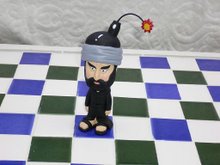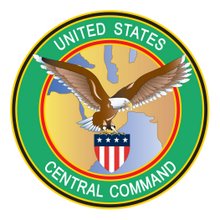
 Back to headlines
Back to headlinesWitness testifies against Al-Timimi
By Debra ErdleyTRIBUNE-REVIEW
Sunday, April 10, 2005
Kwon, 29, is a South Korea-born graduate of Virginia Tech who is serving an 11-year prison sentence as a result of his guilty plea last year on federal conspiracy and weapons charges. He has emerged as the prosecution's star witness in the case against Ali Al-Timimi, an American Islamic scholar charged with recruiting soldiers for the Taliban just five days after Sept. 11.
Al-Timimi, 41, who maintains his innocence, sat quietly with his attorneys as the case against him unfolded last week during Kwon's testimony in an Alexandria, Va. courtroom. Al-Timimi was indicted last year on 10 counts, including charges of soliciting others to levy war and inducing others to join the Taliban. If convicted on all counts, he could face life in prison.
Kwon, one of nine men convicted last year in the so-called "paintball jihad" network, told a chilling tale of the birth of an American jihad.
The holy war was conceived in the suburbs of Washington, D.C., in the dawn of the 21st century and was born at a meeting in his Fairfax, Va. apartment Sept. 16, 2001, when Kwon said he and several companions decided to heed the call of spiritual adviser Al-Timimi and to be trained to join the Taliban.
Four days later, Kwon was on a flight to Karachi, Pakistan.
The call to holy war took Kwon, who became a U.S. citizen in August 2001, to the mountain training camps of Lashkar-e-Taiba -- known as the LET -- a group that the U.S. placed on its terrorist list in December 2001.
Under the guidance of militants who trained holy warriors for battle in Afghanistan, Kwon honed his skills with semi-automatic weapons and learned to fire a grenade launcher.
Kwon, though, said he never was able to join the Taliban. He was simply too late. The border between Afghanistan and Pakistan closed as U.S. forces took control of Afghanistan shortly before Kwon completed his training at the LET camp.
He said his mentors offered him another option: Go back to the United States and gather information for the mujahadeen, or holy warriors.
Kwon has become a key part of the government's case against the "paintball jihad" following his arrest in 2003.
He testified last year against several members of the group; has cooperated with terrorism investigators in Great Britain and Australia; and now is testifying against Al-Timimi -- all in hopes of earning a reduced sentence.
Dressed in a dark-green prison jumpsuit, the tall, bearded Kwon told jurors how he first heard Al-Timimi speak in 1997 at an Islamic Assembly of North America conference in Chicago.
Born to Christian parents, Kwon converted to Islam in 1997 and quickly found scholar Al-Timimi lecturing regularly near his Northern Virginia home.
Al-Timimi was known in strict Muslim communities across the word for his taped and Internet lectures. Supporters point to well-known lectures calling for peace in the wake of the first World Trade Center attack in 1993.
Al-Timimi also was listed as an advisory board member of Assirat Al-Mustaqueem -- an international Arabic language magazine published in Pittsburgh from 1991 to 2000.
The magazine called for holy war against Christians and Jews. It also lauded the international army that Osama bin Laden assembled for the Taliban in Afghanistan. The magazine once featured an article lauding Shamil Basayev, the Chechen rebel who took credit for last fall's bloody Beslen school massacre in which more than 300 people -- many of them school children -- were slain.
Kwon said he grew to know and respect Al-Timimi as he regularly attended lectures at Dar Al Arqam mosque in Falls Church, Va.
Al-Timimi's lectures on such topics as the purification of the soul and the new world order were only one side of Kwon's pursuit of Islam.
The other side played out among Kwon and a small group of Muslim friends on the paintball fields and target ranges ringing Washington. That side focused on jihad -- violent holy war. And that focus turned to an obsession among Kwon and his friends long before Sept. 11, 2001, Kwon testified.
The group, which included two U.S. military veterans and several engineers, gathered regularly, starting in early 2000, to talk about or prepare for jihad.
"Russian Hell" -- a jihad video that featured bloody clips of a Chechen Muslim rebel leader executing a Russian prisoner of war -- was a favorite among the videos that the group exchanged and discussed.
"They (the videos) motivated us. It was like they gave us inspiration," Kwon testified.
Martyrdom, too, was a topic.
"As a Muslim, it's something you aspire to," Kwon said, answering questions from assistant U.S. Attorney Gordon Kromberg. "We talked about it. I don't know how realistic we were, but we talked about it because it was very noble," Kwon told the jury of nine men and five women before U.S. District Court Judge Leonie M. Brinkema.
Members of the group wanted to be ready to take up arms -- should the need to defend Islam arise, Kwon said -- and they began traveling to shooting ranges for target practice and to paintball fields to execute military maneuvers.
Al-Timimi never was a part of their games, Kwon said, but he and other witnesses said the man they characterized as a respected mentor was aware of them. Indeed, they consulted Al-Timimi when the FBI visited one of the members of their group with questions. Al-Timimi's advice: Be more circumspect about their activities, Kwon and others testified.
Kwon recalled driving Al-Timimi home from the mosque Sept. 11, 2001 after the terrorist attacks. He said Al-Timimi and another scholar argued, with Al-Timimi characterizing the attacks as a punishment of America from God, while his fellow scholar decried the attacks.
That night, as they drove from the mosque, Kwon said Al-Timimi had a request.
"He told me to gather some brothers, to have a contingency plan in case there were mass hostilities toward Muslims in America," Kwon said.
Five days later, Al-Timimi met with Kwon again, this time at the young engineer's apartment where he gathered a small group of friends.
"He told me to unplug the message machine and turn off the phones."
Then, Kwon said, Al-Timimi advised the group that the effort to spread Islam in the United States was over and that the only other options open to them were to repent, leave the U.S. and join the mujahadeen -- the holy warriors preparing to defend Afghanistan against the coming U.S. invasion.
Four days later, Kwon was on the plane to Pakistan, embarking on a jihad that would land him in prison.
"I made the decision to go, but (Al-Timimi) was a big part of my decision to go," Kwon said.
Debra Erdley can be reached at derdley@tribweb.com or 412-320-7996.





1 comment:
Yoo innsalt us. Wea are to vicory upon your prosciutto of Satan.
wEE NO wear you leave and wut you ride.
beewear infidel
(Islamic asshole)
Amhadi Geszundheit
Post a Comment